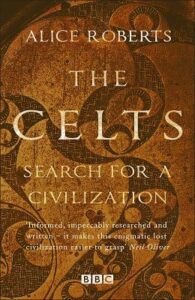 The Celts: Search for a Civilisation, Alice Roberts
The Celts: Search for a Civilisation, Alice Roberts
This book was written to accompany a BBC series that I haven’t seen, but that doesn’t seem to detract from it any. I seem to be seeing a lot of people lately considering the issues of Celtic identity: how do we pin it down? Is it based on language, material culture, genetics? Is it really a thing? I’ve been to the temporary Celtic exhibit in the British Museum, as well as read this and — for contrast — Graham Robb’s The Ancient Paths, which views Celtic identity as very contiguous across Europe. (It is reassuring that most of the facts here chimed with Robb’s claims, if you’d like to believe in his theories!)
This book surveys evidence from all over Europe, eventually coming to the conclusion that Celticness might have originated in the West and spread east, rather than the other way round. It also pours cold water on the idea of human sacrifices (though it doesn’t mention some of the archaeological evidence about Boudicca’s revolt and the claims of human sacrifice and barbaric practices around that), with what I think seems like justified scepticism. Roberts points out that we’ve got a fundamental problem where the literature is interpreted in ways which prop up the interpretation of archaeological finds, at the same time as those archaeological finds are held up as truth in interpreting the literature.
Overall, Roberts is relatively unconclusive, if conclusions are what you’re looking for. Celtic identity is a bit of a morass, and its modern importance to Welsh, Scottish, Irish and Cornish people may well be a very recent construct. That makes it no less powerful, and there’s something understandable and powerful in modern people looking back to our ancestors and trying to understand them, claiming to be a part of them. After all, we must be.

Leave a Reply